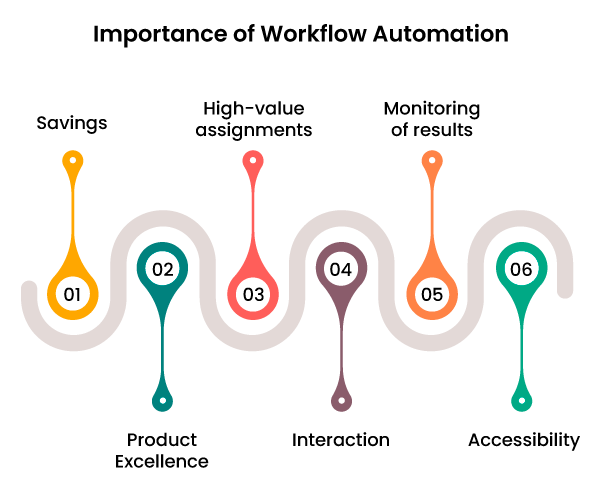
A workflow is a repeatable sequence of steps you undertake to carry out a process. Consider it a series of tasks that move from one stage to the next until it is completed.
Workflow automation eliminates human intervention and improves the efficiency of a process; workflow management is an approach that businesses undertake to ensure the smooth flow of every task. Workflow automation and Workflow Management make a powerful combination for businesses to achieve astounding heights.
But before we dig deeper, did you know that workers manually hunt for files for more than 50% of their time? So how do we enhance these processes and ensure efficient results with minimal resources? Enters Workflow automation.
What is Workflow Automation?
A practical example of a workflow would be creating a support ticket to resolve a customer query and ensure the resolution on every step.
Workflow automation is the automation of steps involved in a workflow to perform your tasks quickly and accurately every time the workflow is run. Workflow automation, to put it another way, is a set of automated actions generated for the steps in a business workflow process.
Also Read: Mastering Workflow Diagrams: Definitions, Types, Symbols, and Theories
What is Workflow Management?
People tend to use workflow automation and workflow management interchangeably. However, workflow management is optimizing, creating, documenting, and monitoring the workflow for optimum results. But Custom Workflow management brings visibility to the job, which leads to a better understanding of how to do it.
For smooth completion of a process, workflows are carried out, and workflow management is performed for efficient execution of the workflow.
Also Read: Five Strategies to Improve your Workflow Management Software
Let us dig a little deeper into understanding workflow automation and workflow management.
What is the Difference Between Workflow Automation and Workflow Management?
Although workflow automation and workflow management are pretty similar, there are a few fundamental distinctions.
- The automation of the fulfilment of specified activities is known as workflow automation. Workflow management refers to the more comprehensive automation of a series of tasks.
- Individual job completion is made easier and faster-using workflow automation. Workflow management improves the accuracy and efficiency of the operational stages required to accomplish a project, which may contain several jobs.
- Micro-level operations, such as signing a paper, are sometimes called workflow automation. Workflow management is frequently used to refer to macro-level objectives, such as increasing customer experience.
Workflow management initiatives should be considered larger-scale efforts than workflow automation projects. Considering they can have a broader scope and bring proportionately more value to the firm.
Also Read: AI Workflow Automation: A New Era of Streamlined Processes
What are the Similarities Between Workflow Automation and Workflow Management?
Several people interchange the words workflow automation and workflow management since they may both benefit companies:
- Spend less time on tasks.
- Day-to-day operations should simplify.
- Increase operational productivity and efficiency.
- People, information, and systems are all connected.
- Create, track, and evaluate the results of specific activities and procedures.
To maximize productivity, workflow automation, and workflow management guarantee that the correct information is directed to the appropriate person at the right time. They lower the chance of mistakes, boost employee productivity, shorten job completion times, and boost profits.
Both workflow automation and workflow management may help a company become more transparent and trustworthy. Workflow automation and workflow management help enhance the confidence of everyone engaged. They allow employees, stakeholders, contracts, and customers or clients, to do better, quicker, and error-free processes.

Also Read: Achieving Efficiency Amid Automation Challenges: Expert Tips
What is the Importance of Workflow Management?
- Drives Efficiency: By streamlining tasks, reducing bottlenecks, and automating repetitive processes, workflow management significantly enhances workflow efficiency.
- Fosters Collaboration: It creates a centralized platform for teams to communicate, share information, and collaborate seamlessly on projects.
- Informs Decision-Making: Provides valuable data and insights into process performance, enabling data-driven decisions and strategic planning.
- Delivers Customer Satisfaction: By accelerating processes and ensuring consistent service quality, workflow management enhances overall customer experience.
- Optimizes Costs: Through efficient resource allocation, reduced errors, and faster time-to-market, workflow management contributes to cost savings.
Why is Workflow Automation Important?
Workflows should be automated and managed whenever possible for various reasons, including improving the efficiency and accuracy of automated approval processes and accomplishing speedier operations. The importance of workflow automation can be described below:

Savings
Cost reductions result from increased productivity.
Product excellence
Overall, product quality increases when human error is reduced.
Also Read: What is Workflow Applications? 6 Examples Explaining its Operational Efficiency
High-value assignments
Automation frees people to work on higher-value, non-automated jobs that only humans can do by removing them from low-value, tedious chores.
Interaction
As a result of the greater visibility, employee and interdepartmental communication and collaboration can improve. Furthermore, increasing productivity and reducing bottlenecks.
Monitoring of results
Automation can track the performance of a workflow from beginning to end by digitizing the operations inside it. This allows a company to assess how effectively its operations are running quickly.
Accessibility
The workflow mapping used to program automation software provides visibility into the automated operations. This provides a top-down perspective of an organization’s processes and allows us to identify obsolete or redundant procedures that waste time and money.

Also Read: 11 Tips to Selecting the Right Workflow Automation Software
How to Determine if Your Workflow Should Be Automated
Determining whether a workflow should be automated requires a careful evaluation of its characteristics. Here are some key indicators:
High Volume, Repetitive Tasks
- Frequent occurrences: Tasks performed multiple times daily, weekly, or monthly.
- Standardized procedures: Consistent steps with minimal variations.
- Error-prone: Manual processes leading to frequent mistakes or inconsistencies.
Time-Consuming Processes
- Long cycle times: Significant delays between process initiation and completion.
- Resource-intensive: Requiring substantial human effort or involvement.
- Impact on productivity: Slowing down overall operations.
Bottlenecks and Delays
- Congestion points: Specific stages causing significant delays.
- Inefficient handoffs: Time-consuming transfers of work between departments or individuals.
- Missed deadlines: Frequent failure to meet target completion dates.
Compliance and Risk
- Regulatory requirements: Adherence to strict rules and standards.
- Data security concerns: Handling sensitive information that requires protection.
- Audit trails: Need for detailed records of process execution.
Cost Efficiency
- High labor costs: Significant expenditure on manual tasks.
- Overtime or additional resources: Required to handle workload.
- Potential for cost savings: Automation leading to reduced expenses.
By carefully analyzing these factors, you can identify workflows that are prime candidates for automation. Remember, not all processes are suitable for automation, and a balanced approach is often necessary.
Conclusion
Successful businesses manage their workflows efficiently, automating them wherever possible to save resources. Therefore, a workflow management system is a great tool every company should invest in to achieve business goals.
Ready to supercharge your organization’s growth? Start by assessing your automation potential with our Automation Report Card. When an organization’s fundamental functions are well defined and managed with care, it works smoothly and can focus on more pressing issues than mundane problems like retrieving old emails. Quixy’s workflow management system will help you achieve this and so much more. Take the first step and get started with Quixy today.
Frequently Asked Questions (FAQs)
Q. What Metrics to Evaluate for Success of Workflow Automation?
Businesses should track process cycle time, error rates, task completion rates, and resource utilization. Monitoring these metrics helps assess efficiency gains, cost savings, and productivity improvements brought about by workflow automation.
Q. How Does Workflow Automation Impact Customer Experience & Satisfaction?
Workflow automation enhances customer experience by enabling quicker response times, personalized interactions, and streamlined service delivery. This results in improved satisfaction levels due to faster issue resolution and more consistent service quality.
Q. What Are Benefits of Implementing Workflow Automation?
Key benefits of workflow automation include increased operational efficiency, reduced errors, faster process execution, improved resource allocation, and enhanced scalability. Businesses can achieve higher productivity & cost savings while maintaining quality.
Q. What is difference between Workflow Management & Automation?
Workflow management involves designing, executing, and overseeing processes, focusing on optimizing processes and tasks. Workflow automation, on the other hand, employs technology to execute tasks without manual intervention. While management involves decision-making and orchestration, automation focuses on task execution.
Q. What Role Does Artificial Intelligence (AI) Play in Workflow Automation?
AI plays a significant role in workflow automation by enabling predictive analytics, intelligent decision-making, and adaptive processes. It empowers automation to handle complex scenarios, optimize resource allocation, and even provide personalized customer experiences, ultimately enhancing efficiency and effectiveness.















